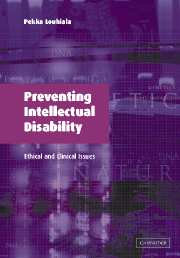Book contents
- Frontmatter
- Contents
- Acknowledgements
- 1 Introduction
- 2 On the definition of intellectual disability?
- 3 Epidemiology of intellectual disability
- 4 Prevention of intellectual disability: general issues
- 5 Prenatal diagnosis and screening
- 6 Genetic counselling
- 7 Why should intellectual disability be prevented?
- 8 Moral status and intellectual disability
- 9 The ethics of prevention in practice: three syndromes
- 10 Conclusion
- References
- Index
7 - Why should intellectual disability be prevented?
Published online by Cambridge University Press: 09 August 2009
- Frontmatter
- Contents
- Acknowledgements
- 1 Introduction
- 2 On the definition of intellectual disability?
- 3 Epidemiology of intellectual disability
- 4 Prevention of intellectual disability: general issues
- 5 Prenatal diagnosis and screening
- 6 Genetic counselling
- 7 Why should intellectual disability be prevented?
- 8 Moral status and intellectual disability
- 9 The ethics of prevention in practice: three syndromes
- 10 Conclusion
- References
- Index
Summary
In the chapter on prevention I briefly discussed the general reasons that have been presented as a justification for the prevention of ID. This chapter examines each of the issues in detail. The arguments considered are (1) the eugenic argument, (2) the foetal-wastage argument, (3) the family burden argument, (4) the societal burden argument and (5) the quality of life argument.
But before going to the individual arguments something must be said about a common factor behind arguments 3, 4 and 5, namely, the issue of preventing suffering. With different stress, these arguments seem to take it for granted that ID causes suffering by the individual, the family or society. It is also assumed that this suffering should be avoided if possible. Behind these arguments seems to be the utilitarian idea that we are morally obliged to diminish or at least not increase the total sum of suffering in the world.
But what is suffering, and is it always an evil that should be avoided? Does ID as such always increase the amount of suffering in the world?
The word ‘suffering’ can mean a lot of things, ‘from an absence of happiness to enduring extreme pain’ (Hauerwas 1986, p. 30). Cassell (1995, p. 1899) has defined suffering as ‘a specific state of severe distress induced by the loss of integrity, intactness, cohesiveness, or wholeness of the person, or by a threat that the person believes will result in the dissolution of his or her integrity’.
- Type
- Chapter
- Information
- Preventing Intellectual DisabilityEthical and Clinical Issues, pp. 86 - 116Publisher: Cambridge University PressPrint publication year: 2003



